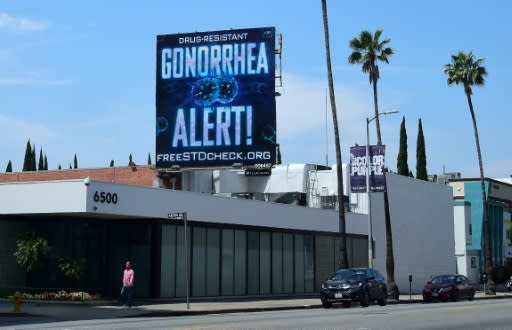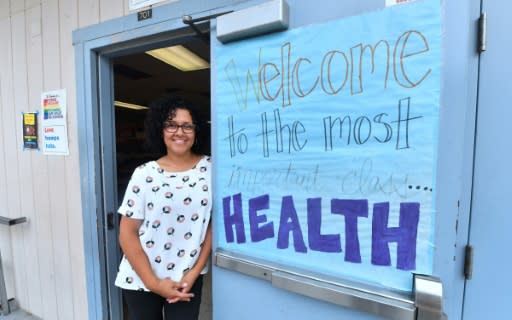California on front line as STDs run rampant in US
A billboard on Sunset Boulevard in Hollywood screams out a stark warning: "drug-resistant gonorrhea alert!" The words are set against a black background and accompanied by a microscope shot of the gonococcus bacteria, which causes the illness now running rampant in California. Sexually transmitted diseases have made an alarming resurgence across the United States, where 2016 saw a record two million cases of chlamydia, gonorrhea and syphilis, including 628 cases of congenital syphilis. But California, the most populous US state, stands out for its willingness to tackle the crisis head-on, with cases of the three ailments up 45 percent in 2017 from five years ago. Thirty babies were stillborn amid 300 reported cases of congenital syphilis, more than in any other US state last year. "These are incredibly alarming numbers," said Heidi Bauer, chief of the STD control branch of the California Department of Public Health. She said it amounts to an epidemic. Congenital syphilis had been essentially eliminated from the United States, as it had in developing countries such as Cuba, Thailand and Moldova in the former Soviet Union, said Jeffrey Klausner of the UCLA school of medicine. "But you know the fact that congenital syphilis is roaring back in the states and in California is a shameful reminder of our inadequate public health programs," he said. The cases of the stillborn babies are 100 percent preventable and this is "a slap in the face," he added. Herein the problem seems to lie: the US health system is more reactive than preventive. And there is a lack of prevention and public awareness campaigns in a society in which people do not like to talk about sex. - Government not a help - The striking billboards in Los Angeles are sponsored by an NGO called the AIDS Healthcare Foundation, which aims to prevent or diagnose HIV and provide medical care for those who have it or other sexually transmitted diseases in free clinics. Another sign about syphilis shows a torso ravaged by open wounds. The foundation's president, Michael Weinstein, said the NGO's campaign has boosted visits to its clinics by 50 percent in Los Angeles. By comparison, in south Florida, where cities such as Miami Beach or Fort Lauderdale as considered hotbeds of STDs, such campaigns are barred because they are deemed to be bad for tourism. "You educate, you prevent, you test. You treat. You contact partners," said Weinstein. "We're not doing any of those things adequately." The discouraging figures will keep rising and "the government is not helping," he warns. The financial crisis of 2008 -- at the time STDs were not of particular concern -- led to deep cuts in health care spending, so many clinics shut down. Add to this an increase in poverty, homelessness, drug use and pregnancies undertaken without proper healthcare -- all considered risk factors for congenital syphilis. California has the world's fifth largest economy but the budget for fighting STDs is a paltry $20 million, which includes money that comes from the federal government. "There's a fire burning in California. And when a fire is burning, you don't ask how much it costs to put it out. You supply whatever's needed to put it out," said Weinstein, insisting this is not happening in the case of STDs. He said most of the NGOs patients are under age 25, and that with gonorrhea and syphilis -- which are harder and harder to cure because of bacteria's resistance to antibiotics -- a higher proportion of cases involve gay men. - Not enough talk about sex - Sex education is mandatory in California schools. Many teachers are reluctant to talk about it, but not Leticia Jenkins. She speaks of it freely to her high school freshmen in the Los Angeles suburb of North Hills, who are working on posters to draw attention to STDs. They use precise scientific language and are not at all skittish. They write down symptoms of STDs and ways to treat or prevent them. Jenkins said STD figures are out of control these days, and that talking about sex is essential. "Schools don't talk enough about sex. We do," said Jenkins. Some students said that in fact they do not talk about sex with their parents. "They're old," said Norberto Osorio, 14 -- although he had talked about sex with his older brother. "We didn't talk and I wouldn't like to talk now. I think it would make us both uncomfortable," fellow student Jessie Flores said of his parents. "I didn't know any of this stuff before I had her," the 15 year old said of his teacher. California, the most populous US state, is taking steps to tackle a nationwide resurgence of sexually transmitted diseases Michael Weinstein, head of the AIDS Healthcare Foundation NGO, warns that current US efforts to curb the rise of sexually transmitted diseases do not go far enough Californian health education teacher Leticia Jenkins believes that talking to students about sex is essential Students work on posters about sexual health at James Monroe High School in the Los Angeles suburb of North Hills





